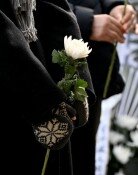[Opinion] Use Legalism to Govern the Nation
[Opinion] Use Legalism to Govern the Nation
Posted January. 02, 2006 03:07,
Chinas first emperor, Qin Shi Huang Di, united China by adopting the legal theories of the scholar Hanbija during the Warring States period.
Hanbija, born in Han Dynasty during the Warring States period, claimed that governing a country according to the law is the best way to become wealthy and powerful. Hanbija also emphasized strength and skill as the means to create a law-abiding country. This means that a ruler should use power and diplomacy to govern the people.
The concept of legalism Hanbija insisted on is a far cry from todays legalism in that Hans legalism was a plan to consolidate an emperors reign.
Todays legalism is another expression of democracy. Legalism in modern society only allows a ruler the right to limit the publics freedom and rights under the law, not under arbitrary rule.
Legalism was born after the Puritan Revolution, the Glorious Revolution, the American Revolution, and the French Revolution. We can also trace the Korean history of legalism from Gyeonggukdaejeon (a law book compiled during the Joseon Dynasty). However, there is still a negative view toward law in Korea. Disputes concerning legitimacy are everywhere, not to mention the military dictatorship era that mobilized the law as a way to forcibly govern the country.
In National Assembly Chairman Kim Won-ki raised the issue of legalism for the New Year, he asked lawmakers to make a fresh start to base the 2006 National Assembly on generosity and win-win strategies.
While saying the above, Kim said, Voting for and accepting selected views is the basis of legalism when politicians dont reach an agreement. Kims statement can be interpreted as saying that the hamstrung National Assembly at the end of 2005 was caused by opposition parties.
This is similar to the logic used during the time when people used to say that the National Assembly was created to pass laws made by the government.
Not everything can be justified because it was made in the name of the law. I didnt see any legal defects in the passage of the Private School Law or in the passage of a large number of bills at the end of last year. What matters, however, is how much lawmakers considered public opinion in the process. It is not desirable for lawmakers to rationalize the passage of laws conducted in abnormal way in the National Assembly while the opposition party boycotts the National Assembly.
In 2006, I would like to see an ideal of legalism take root, avoiding disruptions in the National Assembly by using compromise, and making the National Assembly into the center of an ideal of legalism.
Song Dae-keun, Editorial Writer, dksong@donga.com






